Analyzing Impact of Corporate Losses on Motivation at Deutsche Bank
VerifiedAdded on 2023/04/21
|18
|6018
|395
Case Study
AI Summary
This case study investigates the impact of corporate losses on employee motivation, focusing on Deutsche Bank in Karachi, Pakistan. The literature review covers Deutsche Bank's financial performance, motivation theories (Herzberg, Maslow, Vroom, McGregor, Taylor), competition for skilled employees in Pakistan, and the effects of financial crises on bank employees. The study explores how financial losses affect employee motivation, particularly concerning pay scales, bonuses, and job security. It also addresses the challenges faced by Pakistani workers in the global labor market and the potential impact of financial crises on employment within the banking sector. The research methodology includes a detailed plan for data collection and analysis to formulate a comprehensive understanding of the relationship between corporate losses and employee motivation within the specific context of Deutsche Bank Karachi.
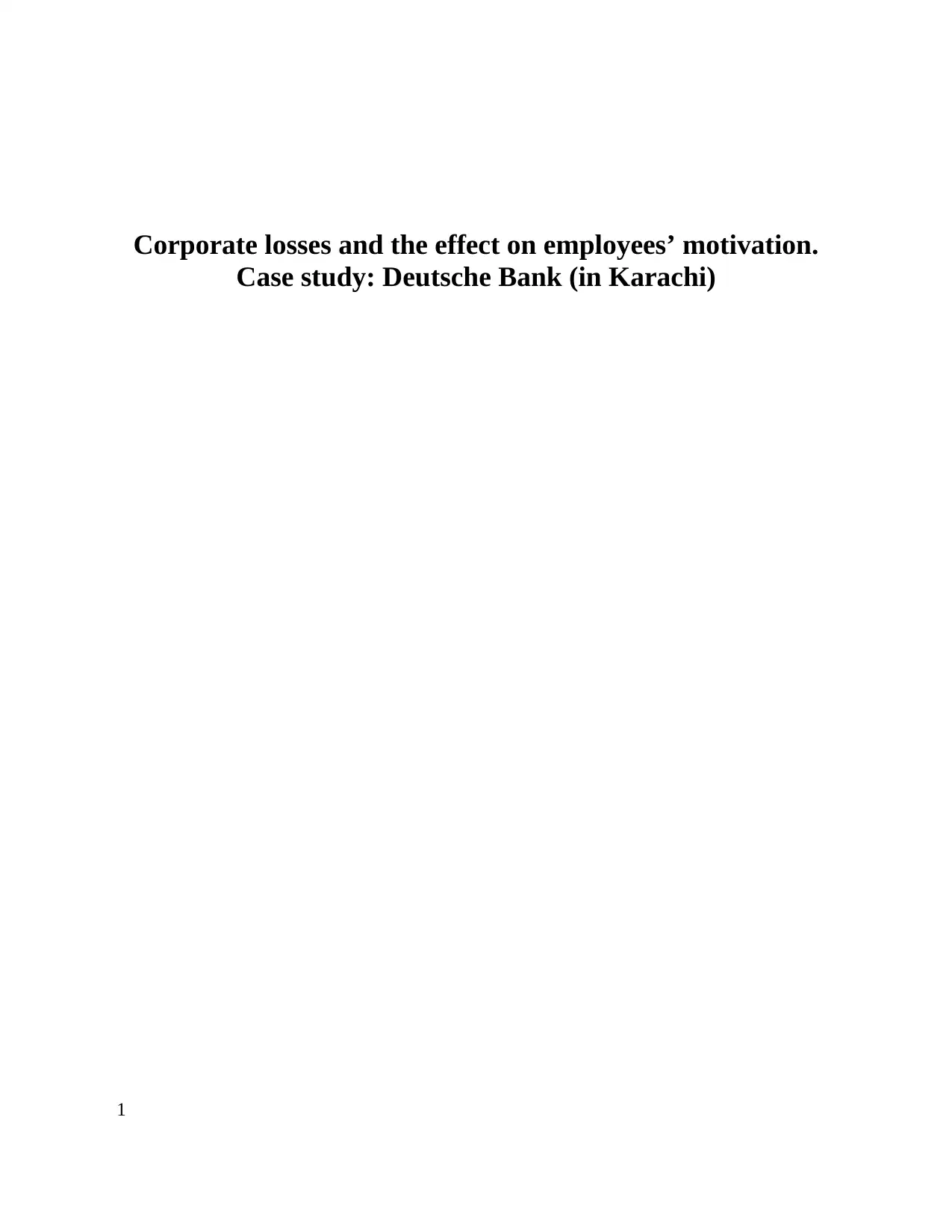
Corporate losses and the effect on employees’ motivation.
Case study: Deutsche Bank (in Karachi)
1
Case study: Deutsche Bank (in Karachi)
1
Paraphrase This Document
Need a fresh take? Get an instant paraphrase of this document with our AI Paraphraser
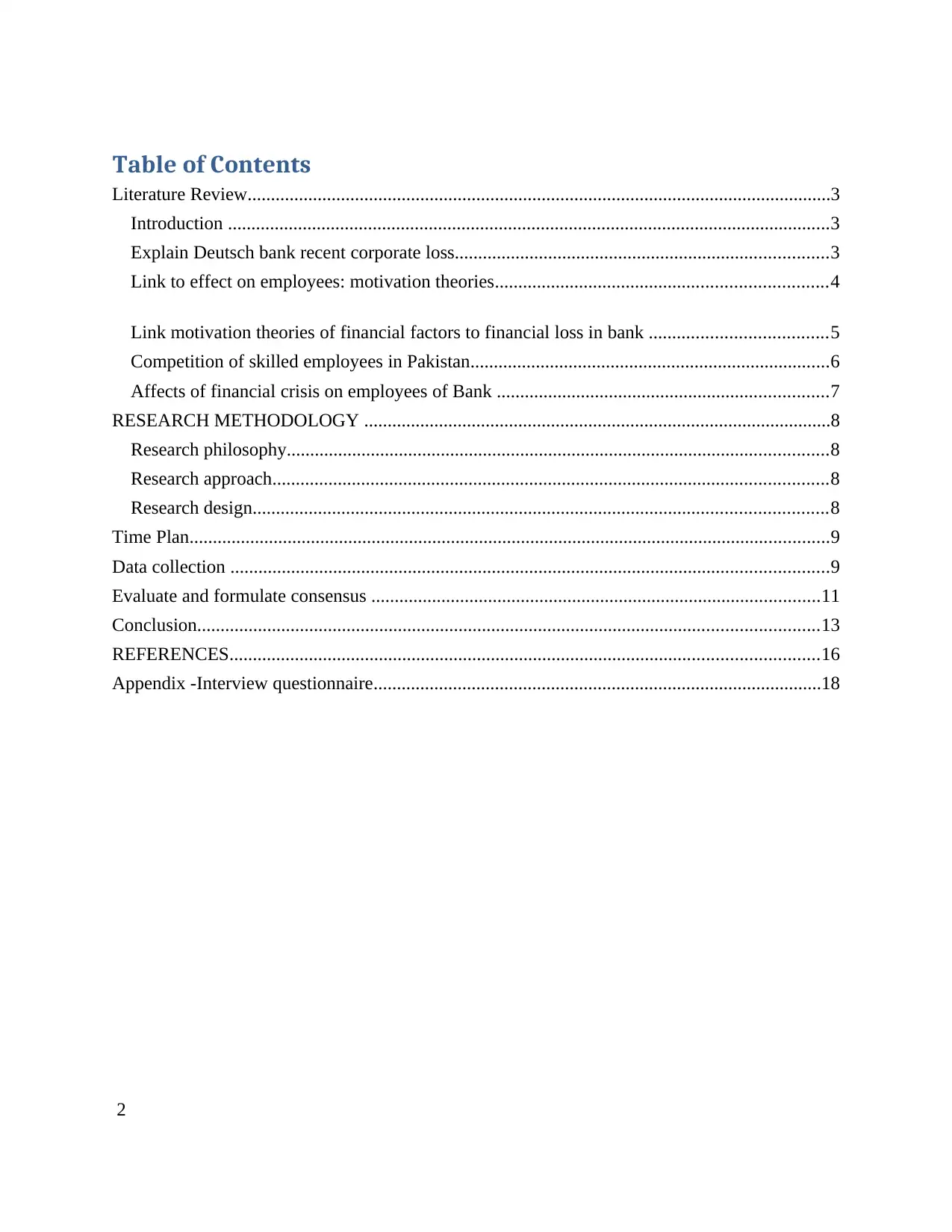
Table of Contents
Literature Review.............................................................................................................................3
Introduction .................................................................................................................................3
Explain Deutsch bank recent corporate loss................................................................................3
Link to effect on employees: motivation theories.......................................................................4
Link motivation theories of financial factors to financial loss in bank ......................................5
Competition of skilled employees in Pakistan.............................................................................6
Affects of financial crisis on employees of Bank .......................................................................7
RESEARCH METHODOLOGY ....................................................................................................8
Research philosophy....................................................................................................................8
Research approach.......................................................................................................................8
Research design...........................................................................................................................8
Time Plan.........................................................................................................................................9
Data collection ................................................................................................................................9
Evaluate and formulate consensus ................................................................................................11
Conclusion.....................................................................................................................................13
REFERENCES..............................................................................................................................16
Appendix -Interview questionnaire................................................................................................18
2
Literature Review.............................................................................................................................3
Introduction .................................................................................................................................3
Explain Deutsch bank recent corporate loss................................................................................3
Link to effect on employees: motivation theories.......................................................................4
Link motivation theories of financial factors to financial loss in bank ......................................5
Competition of skilled employees in Pakistan.............................................................................6
Affects of financial crisis on employees of Bank .......................................................................7
RESEARCH METHODOLOGY ....................................................................................................8
Research philosophy....................................................................................................................8
Research approach.......................................................................................................................8
Research design...........................................................................................................................8
Time Plan.........................................................................................................................................9
Data collection ................................................................................................................................9
Evaluate and formulate consensus ................................................................................................11
Conclusion.....................................................................................................................................13
REFERENCES..............................................................................................................................16
Appendix -Interview questionnaire................................................................................................18
2
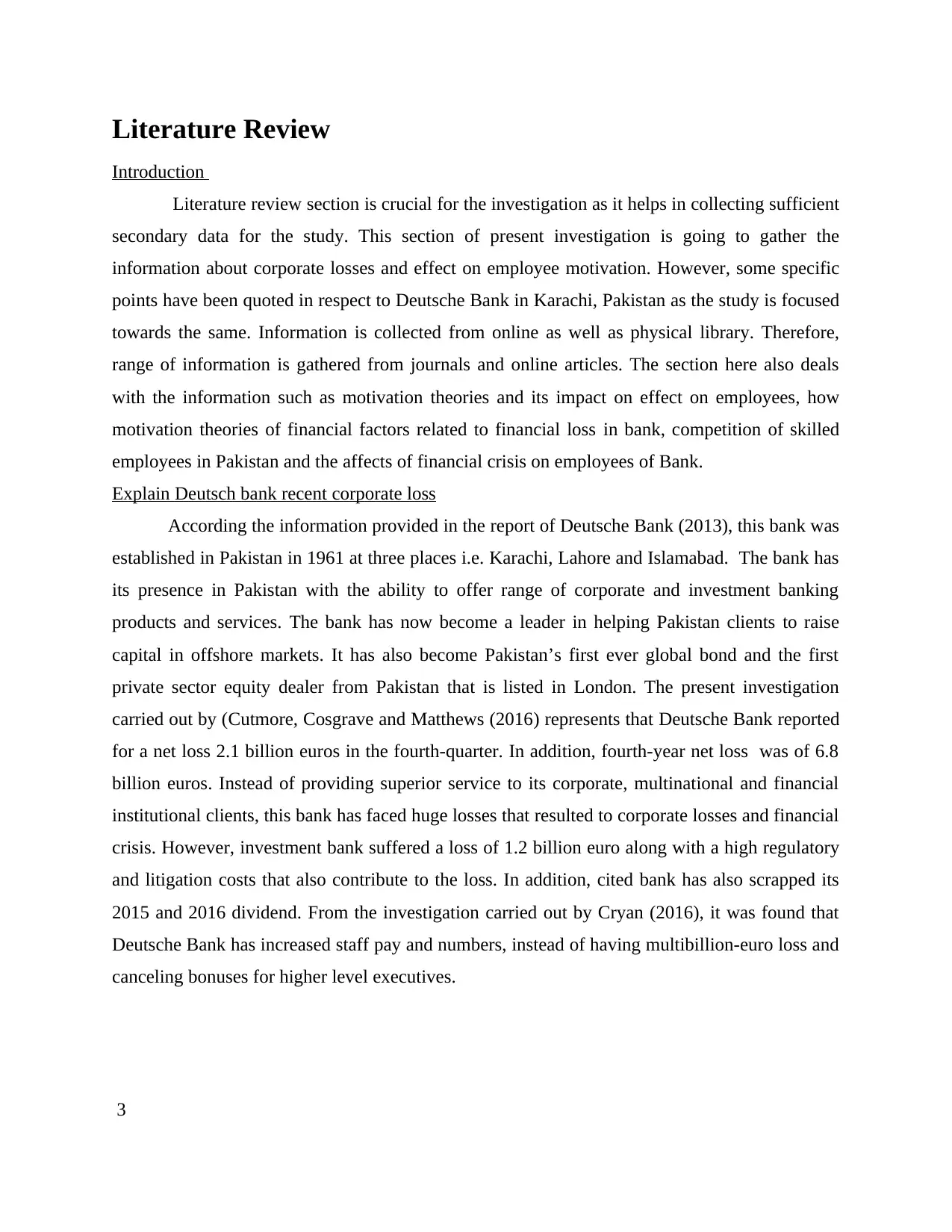
Literature Review
Introduction
Literature review section is crucial for the investigation as it helps in collecting sufficient
secondary data for the study. This section of present investigation is going to gather the
information about corporate losses and effect on employee motivation. However, some specific
points have been quoted in respect to Deutsche Bank in Karachi, Pakistan as the study is focused
towards the same. Information is collected from online as well as physical library. Therefore,
range of information is gathered from journals and online articles. The section here also deals
with the information such as motivation theories and its impact on effect on employees, how
motivation theories of financial factors related to financial loss in bank, competition of skilled
employees in Pakistan and the affects of financial crisis on employees of Bank.
Explain Deutsch bank recent corporate loss
According the information provided in the report of Deutsche Bank (2013), this bank was
established in Pakistan in 1961 at three places i.e. Karachi, Lahore and Islamabad. The bank has
its presence in Pakistan with the ability to offer range of corporate and investment banking
products and services. The bank has now become a leader in helping Pakistan clients to raise
capital in offshore markets. It has also become Pakistan’s first ever global bond and the first
private sector equity dealer from Pakistan that is listed in London. The present investigation
carried out by (Cutmore, Cosgrave and Matthews (2016) represents that Deutsche Bank reported
for a net loss 2.1 billion euros in the fourth-quarter. In addition, fourth-year net loss was of 6.8
billion euros. Instead of providing superior service to its corporate, multinational and financial
institutional clients, this bank has faced huge losses that resulted to corporate losses and financial
crisis. However, investment bank suffered a loss of 1.2 billion euro along with a high regulatory
and litigation costs that also contribute to the loss. In addition, cited bank has also scrapped its
2015 and 2016 dividend. From the investigation carried out by Cryan (2016), it was found that
Deutsche Bank has increased staff pay and numbers, instead of having multibillion-euro loss and
canceling bonuses for higher level executives.
3
Introduction
Literature review section is crucial for the investigation as it helps in collecting sufficient
secondary data for the study. This section of present investigation is going to gather the
information about corporate losses and effect on employee motivation. However, some specific
points have been quoted in respect to Deutsche Bank in Karachi, Pakistan as the study is focused
towards the same. Information is collected from online as well as physical library. Therefore,
range of information is gathered from journals and online articles. The section here also deals
with the information such as motivation theories and its impact on effect on employees, how
motivation theories of financial factors related to financial loss in bank, competition of skilled
employees in Pakistan and the affects of financial crisis on employees of Bank.
Explain Deutsch bank recent corporate loss
According the information provided in the report of Deutsche Bank (2013), this bank was
established in Pakistan in 1961 at three places i.e. Karachi, Lahore and Islamabad. The bank has
its presence in Pakistan with the ability to offer range of corporate and investment banking
products and services. The bank has now become a leader in helping Pakistan clients to raise
capital in offshore markets. It has also become Pakistan’s first ever global bond and the first
private sector equity dealer from Pakistan that is listed in London. The present investigation
carried out by (Cutmore, Cosgrave and Matthews (2016) represents that Deutsche Bank reported
for a net loss 2.1 billion euros in the fourth-quarter. In addition, fourth-year net loss was of 6.8
billion euros. Instead of providing superior service to its corporate, multinational and financial
institutional clients, this bank has faced huge losses that resulted to corporate losses and financial
crisis. However, investment bank suffered a loss of 1.2 billion euro along with a high regulatory
and litigation costs that also contribute to the loss. In addition, cited bank has also scrapped its
2015 and 2016 dividend. From the investigation carried out by Cryan (2016), it was found that
Deutsche Bank has increased staff pay and numbers, instead of having multibillion-euro loss and
canceling bonuses for higher level executives.
3
⊘ This is a preview!⊘
Do you want full access?
Subscribe today to unlock all pages.

Trusted by 1+ million students worldwide
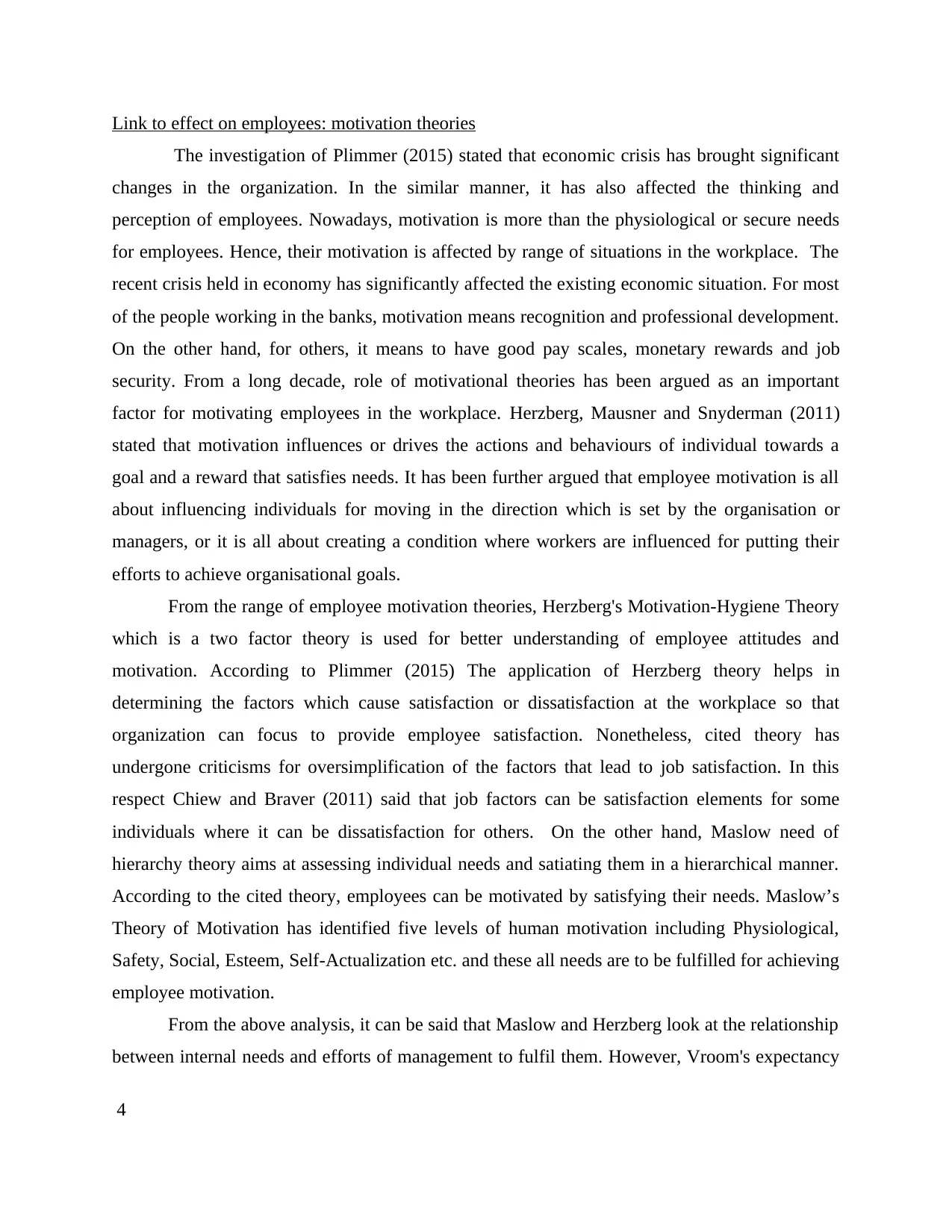
Link to effect on employees: motivation theories
The investigation of Plimmer (2015) stated that economic crisis has brought significant
changes in the organization. In the similar manner, it has also affected the thinking and
perception of employees. Nowadays, motivation is more than the physiological or secure needs
for employees. Hence, their motivation is affected by range of situations in the workplace. The
recent crisis held in economy has significantly affected the existing economic situation. For most
of the people working in the banks, motivation means recognition and professional development.
On the other hand, for others, it means to have good pay scales, monetary rewards and job
security. From a long decade, role of motivational theories has been argued as an important
factor for motivating employees in the workplace. Herzberg, Mausner and Snyderman (2011)
stated that motivation influences or drives the actions and behaviours of individual towards a
goal and a reward that satisfies needs. It has been further argued that employee motivation is all
about influencing individuals for moving in the direction which is set by the organisation or
managers, or it is all about creating a condition where workers are influenced for putting their
efforts to achieve organisational goals.
From the range of employee motivation theories, Herzberg's Motivation-Hygiene Theory
which is a two factor theory is used for better understanding of employee attitudes and
motivation. According to Plimmer (2015) The application of Herzberg theory helps in
determining the factors which cause satisfaction or dissatisfaction at the workplace so that
organization can focus to provide employee satisfaction. Nonetheless, cited theory has
undergone criticisms for oversimplification of the factors that lead to job satisfaction. In this
respect Chiew and Braver (2011) said that job factors can be satisfaction elements for some
individuals where it can be dissatisfaction for others. On the other hand, Maslow need of
hierarchy theory aims at assessing individual needs and satiating them in a hierarchical manner.
According to the cited theory, employees can be motivated by satisfying their needs. Maslow’s
Theory of Motivation has identified five levels of human motivation including Physiological,
Safety, Social, Esteem, Self-Actualization etc. and these all needs are to be fulfilled for achieving
employee motivation.
From the above analysis, it can be said that Maslow and Herzberg look at the relationship
between internal needs and efforts of management to fulfil them. However, Vroom's expectancy
4
The investigation of Plimmer (2015) stated that economic crisis has brought significant
changes in the organization. In the similar manner, it has also affected the thinking and
perception of employees. Nowadays, motivation is more than the physiological or secure needs
for employees. Hence, their motivation is affected by range of situations in the workplace. The
recent crisis held in economy has significantly affected the existing economic situation. For most
of the people working in the banks, motivation means recognition and professional development.
On the other hand, for others, it means to have good pay scales, monetary rewards and job
security. From a long decade, role of motivational theories has been argued as an important
factor for motivating employees in the workplace. Herzberg, Mausner and Snyderman (2011)
stated that motivation influences or drives the actions and behaviours of individual towards a
goal and a reward that satisfies needs. It has been further argued that employee motivation is all
about influencing individuals for moving in the direction which is set by the organisation or
managers, or it is all about creating a condition where workers are influenced for putting their
efforts to achieve organisational goals.
From the range of employee motivation theories, Herzberg's Motivation-Hygiene Theory
which is a two factor theory is used for better understanding of employee attitudes and
motivation. According to Plimmer (2015) The application of Herzberg theory helps in
determining the factors which cause satisfaction or dissatisfaction at the workplace so that
organization can focus to provide employee satisfaction. Nonetheless, cited theory has
undergone criticisms for oversimplification of the factors that lead to job satisfaction. In this
respect Chiew and Braver (2011) said that job factors can be satisfaction elements for some
individuals where it can be dissatisfaction for others. On the other hand, Maslow need of
hierarchy theory aims at assessing individual needs and satiating them in a hierarchical manner.
According to the cited theory, employees can be motivated by satisfying their needs. Maslow’s
Theory of Motivation has identified five levels of human motivation including Physiological,
Safety, Social, Esteem, Self-Actualization etc. and these all needs are to be fulfilled for achieving
employee motivation.
From the above analysis, it can be said that Maslow and Herzberg look at the relationship
between internal needs and efforts of management to fulfil them. However, Vroom's expectancy
4
Paraphrase This Document
Need a fresh take? Get an instant paraphrase of this document with our AI Paraphraser
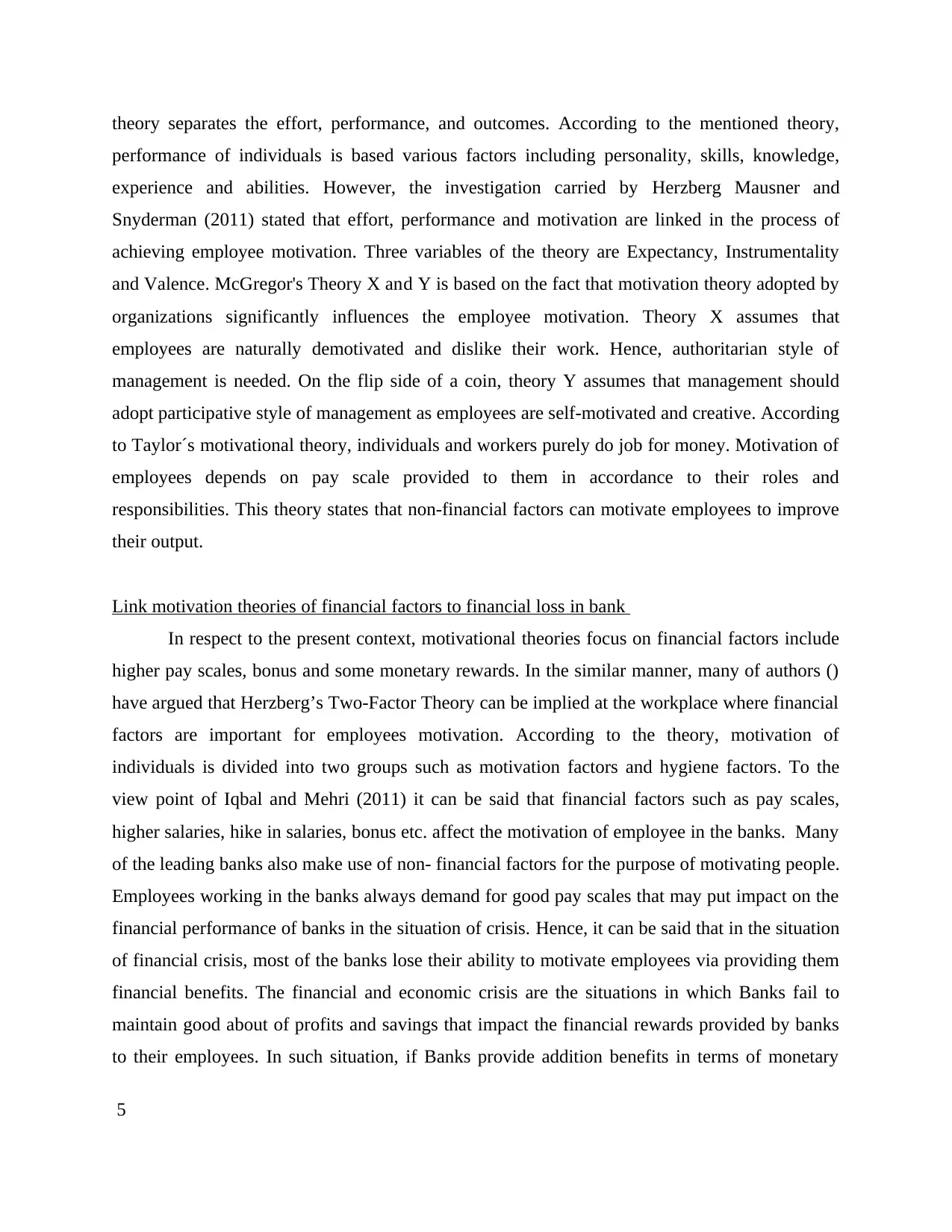
theory separates the effort, performance, and outcomes. According to the mentioned theory,
performance of individuals is based various factors including personality, skills, knowledge,
experience and abilities. However, the investigation carried by Herzberg Mausner and
Snyderman (2011) stated that effort, performance and motivation are linked in the process of
achieving employee motivation. Three variables of the theory are Expectancy, Instrumentality
and Valence. McGregor's Theory X and Y is based on the fact that motivation theory adopted by
organizations significantly influences the employee motivation. Theory X assumes that
employees are naturally demotivated and dislike their work. Hence, authoritarian style of
management is needed. On the flip side of a coin, theory Y assumes that management should
adopt participative style of management as employees are self-motivated and creative. According
to Taylor´s motivational theory, individuals and workers purely do job for money. Motivation of
employees depends on pay scale provided to them in accordance to their roles and
responsibilities. This theory states that non-financial factors can motivate employees to improve
their output.
Link motivation theories of financial factors to financial loss in bank
In respect to the present context, motivational theories focus on financial factors include
higher pay scales, bonus and some monetary rewards. In the similar manner, many of authors ()
have argued that Herzberg’s Two-Factor Theory can be implied at the workplace where financial
factors are important for employees motivation. According to the theory, motivation of
individuals is divided into two groups such as motivation factors and hygiene factors. To the
view point of Iqbal and Mehri (2011) it can be said that financial factors such as pay scales,
higher salaries, hike in salaries, bonus etc. affect the motivation of employee in the banks. Many
of the leading banks also make use of non- financial factors for the purpose of motivating people.
Employees working in the banks always demand for good pay scales that may put impact on the
financial performance of banks in the situation of crisis. Hence, it can be said that in the situation
of financial crisis, most of the banks lose their ability to motivate employees via providing them
financial benefits. The financial and economic crisis are the situations in which Banks fail to
maintain good about of profits and savings that impact the financial rewards provided by banks
to their employees. In such situation, if Banks provide addition benefits in terms of monetary
5
performance of individuals is based various factors including personality, skills, knowledge,
experience and abilities. However, the investigation carried by Herzberg Mausner and
Snyderman (2011) stated that effort, performance and motivation are linked in the process of
achieving employee motivation. Three variables of the theory are Expectancy, Instrumentality
and Valence. McGregor's Theory X and Y is based on the fact that motivation theory adopted by
organizations significantly influences the employee motivation. Theory X assumes that
employees are naturally demotivated and dislike their work. Hence, authoritarian style of
management is needed. On the flip side of a coin, theory Y assumes that management should
adopt participative style of management as employees are self-motivated and creative. According
to Taylor´s motivational theory, individuals and workers purely do job for money. Motivation of
employees depends on pay scale provided to them in accordance to their roles and
responsibilities. This theory states that non-financial factors can motivate employees to improve
their output.
Link motivation theories of financial factors to financial loss in bank
In respect to the present context, motivational theories focus on financial factors include
higher pay scales, bonus and some monetary rewards. In the similar manner, many of authors ()
have argued that Herzberg’s Two-Factor Theory can be implied at the workplace where financial
factors are important for employees motivation. According to the theory, motivation of
individuals is divided into two groups such as motivation factors and hygiene factors. To the
view point of Iqbal and Mehri (2011) it can be said that financial factors such as pay scales,
higher salaries, hike in salaries, bonus etc. affect the motivation of employee in the banks. Many
of the leading banks also make use of non- financial factors for the purpose of motivating people.
Employees working in the banks always demand for good pay scales that may put impact on the
financial performance of banks in the situation of crisis. Hence, it can be said that in the situation
of financial crisis, most of the banks lose their ability to motivate employees via providing them
financial benefits. The financial and economic crisis are the situations in which Banks fail to
maintain good about of profits and savings that impact the financial rewards provided by banks
to their employees. In such situation, if Banks provide addition benefits in terms of monetary
5
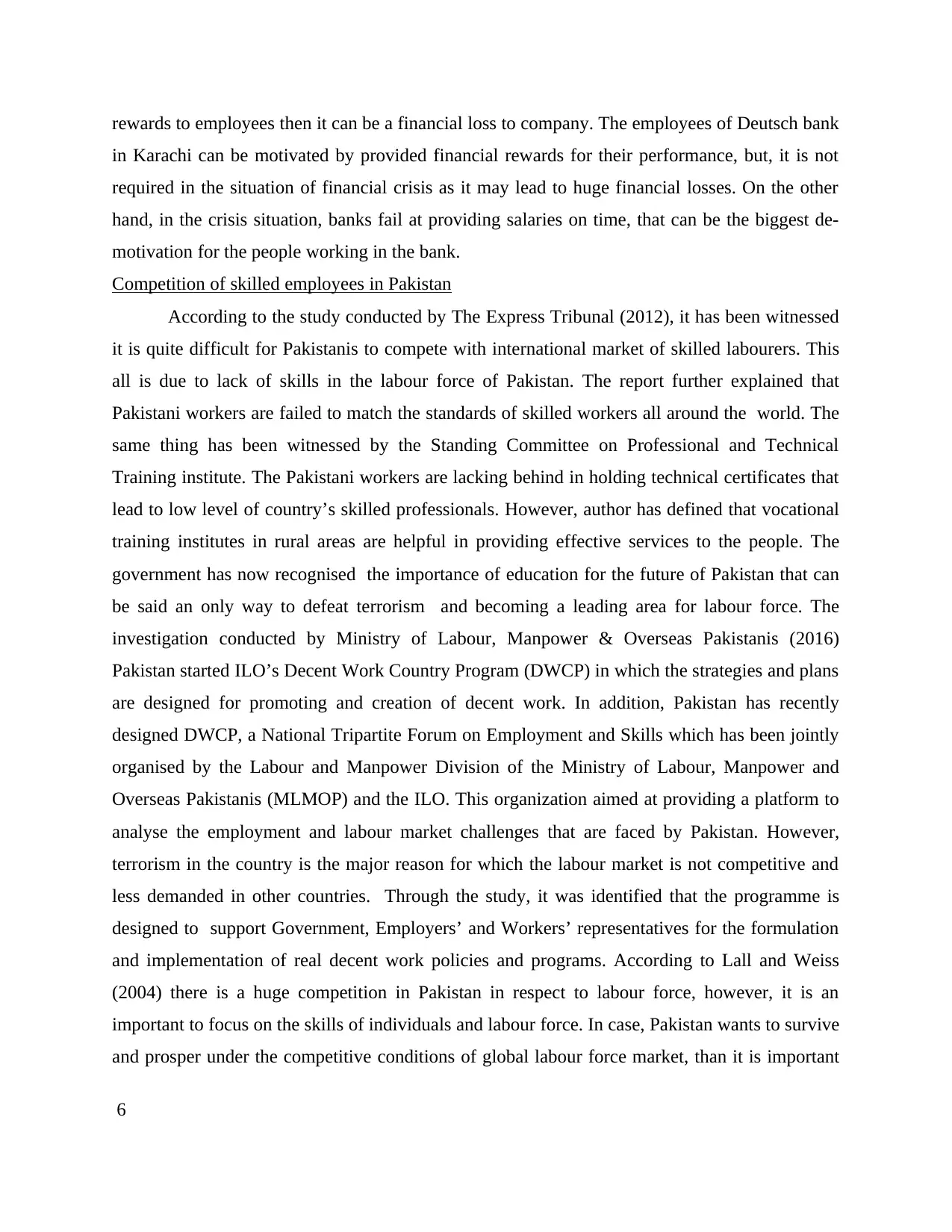
rewards to employees then it can be a financial loss to company. The employees of Deutsch bank
in Karachi can be motivated by provided financial rewards for their performance, but, it is not
required in the situation of financial crisis as it may lead to huge financial losses. On the other
hand, in the crisis situation, banks fail at providing salaries on time, that can be the biggest de-
motivation for the people working in the bank.
Competition of skilled employees in Pakistan
According to the study conducted by The Express Tribunal (2012), it has been witnessed
it is quite difficult for Pakistanis to compete with international market of skilled labourers. This
all is due to lack of skills in the labour force of Pakistan. The report further explained that
Pakistani workers are failed to match the standards of skilled workers all around the world. The
same thing has been witnessed by the Standing Committee on Professional and Technical
Training institute. The Pakistani workers are lacking behind in holding technical certificates that
lead to low level of country’s skilled professionals. However, author has defined that vocational
training institutes in rural areas are helpful in providing effective services to the people. The
government has now recognised the importance of education for the future of Pakistan that can
be said an only way to defeat terrorism and becoming a leading area for labour force. The
investigation conducted by Ministry of Labour, Manpower & Overseas Pakistanis (2016)
Pakistan started ILO’s Decent Work Country Program (DWCP) in which the strategies and plans
are designed for promoting and creation of decent work. In addition, Pakistan has recently
designed DWCP, a National Tripartite Forum on Employment and Skills which has been jointly
organised by the Labour and Manpower Division of the Ministry of Labour, Manpower and
Overseas Pakistanis (MLMOP) and the ILO. This organization aimed at providing a platform to
analyse the employment and labour market challenges that are faced by Pakistan. However,
terrorism in the country is the major reason for which the labour market is not competitive and
less demanded in other countries. Through the study, it was identified that the programme is
designed to support Government, Employers’ and Workers’ representatives for the formulation
and implementation of real decent work policies and programs. According to Lall and Weiss
(2004) there is a huge competition in Pakistan in respect to labour force, however, it is an
important to focus on the skills of individuals and labour force. In case, Pakistan wants to survive
and prosper under the competitive conditions of global labour force market, than it is important
6
in Karachi can be motivated by provided financial rewards for their performance, but, it is not
required in the situation of financial crisis as it may lead to huge financial losses. On the other
hand, in the crisis situation, banks fail at providing salaries on time, that can be the biggest de-
motivation for the people working in the bank.
Competition of skilled employees in Pakistan
According to the study conducted by The Express Tribunal (2012), it has been witnessed
it is quite difficult for Pakistanis to compete with international market of skilled labourers. This
all is due to lack of skills in the labour force of Pakistan. The report further explained that
Pakistani workers are failed to match the standards of skilled workers all around the world. The
same thing has been witnessed by the Standing Committee on Professional and Technical
Training institute. The Pakistani workers are lacking behind in holding technical certificates that
lead to low level of country’s skilled professionals. However, author has defined that vocational
training institutes in rural areas are helpful in providing effective services to the people. The
government has now recognised the importance of education for the future of Pakistan that can
be said an only way to defeat terrorism and becoming a leading area for labour force. The
investigation conducted by Ministry of Labour, Manpower & Overseas Pakistanis (2016)
Pakistan started ILO’s Decent Work Country Program (DWCP) in which the strategies and plans
are designed for promoting and creation of decent work. In addition, Pakistan has recently
designed DWCP, a National Tripartite Forum on Employment and Skills which has been jointly
organised by the Labour and Manpower Division of the Ministry of Labour, Manpower and
Overseas Pakistanis (MLMOP) and the ILO. This organization aimed at providing a platform to
analyse the employment and labour market challenges that are faced by Pakistan. However,
terrorism in the country is the major reason for which the labour market is not competitive and
less demanded in other countries. Through the study, it was identified that the programme is
designed to support Government, Employers’ and Workers’ representatives for the formulation
and implementation of real decent work policies and programs. According to Lall and Weiss
(2004) there is a huge competition in Pakistan in respect to labour force, however, it is an
important to focus on the skills of individuals and labour force. In case, Pakistan wants to survive
and prosper under the competitive conditions of global labour force market, than it is important
6
⊘ This is a preview!⊘
Do you want full access?
Subscribe today to unlock all pages.

Trusted by 1+ million students worldwide
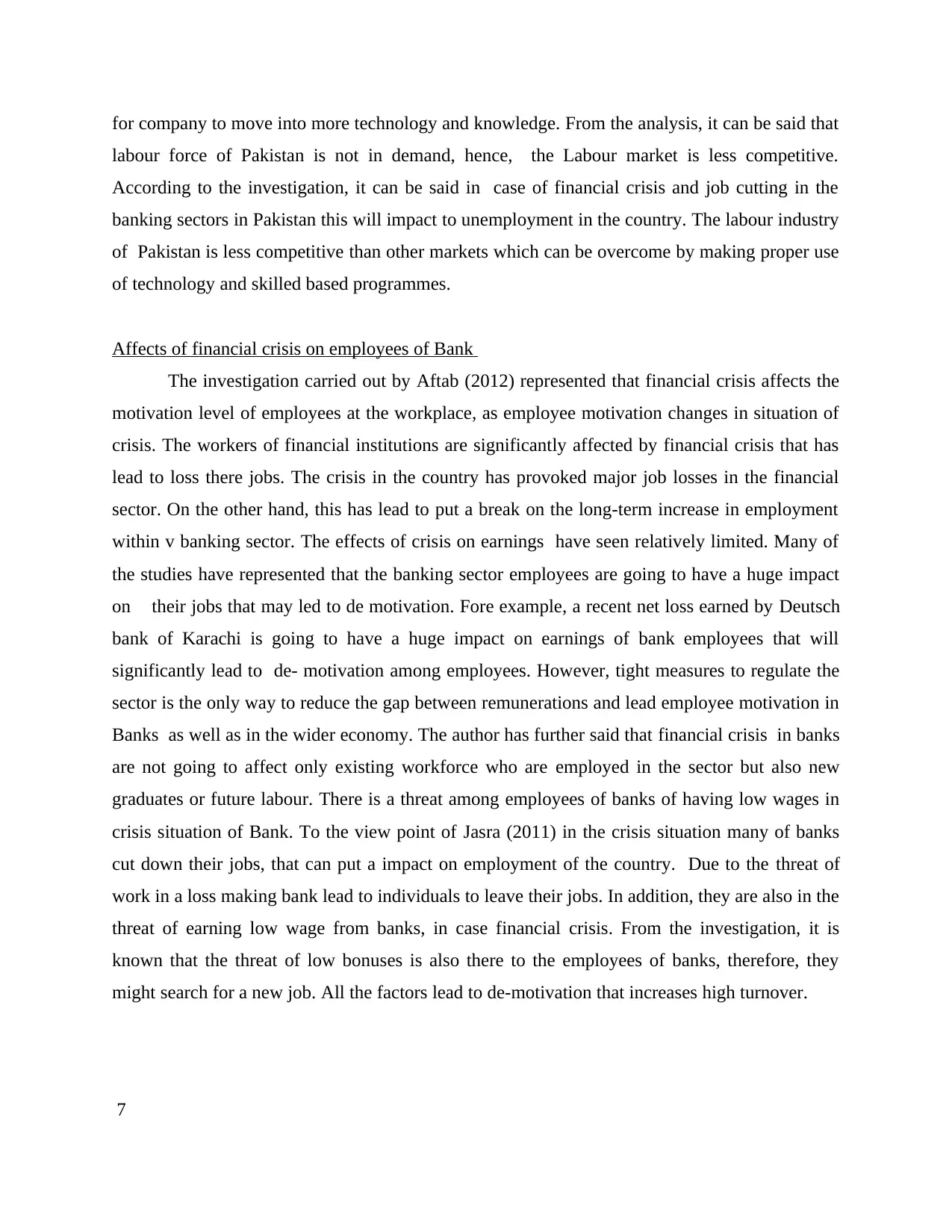
for company to move into more technology and knowledge. From the analysis, it can be said that
labour force of Pakistan is not in demand, hence, the Labour market is less competitive.
According to the investigation, it can be said in case of financial crisis and job cutting in the
banking sectors in Pakistan this will impact to unemployment in the country. The labour industry
of Pakistan is less competitive than other markets which can be overcome by making proper use
of technology and skilled based programmes.
Affects of financial crisis on employees of Bank
The investigation carried out by Aftab (2012) represented that financial crisis affects the
motivation level of employees at the workplace, as employee motivation changes in situation of
crisis. The workers of financial institutions are significantly affected by financial crisis that has
lead to loss there jobs. The crisis in the country has provoked major job losses in the financial
sector. On the other hand, this has lead to put a break on the long-term increase in employment
within v banking sector. The effects of crisis on earnings have seen relatively limited. Many of
the studies have represented that the banking sector employees are going to have a huge impact
on their jobs that may led to de motivation. Fore example, a recent net loss earned by Deutsch
bank of Karachi is going to have a huge impact on earnings of bank employees that will
significantly lead to de- motivation among employees. However, tight measures to regulate the
sector is the only way to reduce the gap between remunerations and lead employee motivation in
Banks as well as in the wider economy. The author has further said that financial crisis in banks
are not going to affect only existing workforce who are employed in the sector but also new
graduates or future labour. There is a threat among employees of banks of having low wages in
crisis situation of Bank. To the view point of Jasra (2011) in the crisis situation many of banks
cut down their jobs, that can put a impact on employment of the country. Due to the threat of
work in a loss making bank lead to individuals to leave their jobs. In addition, they are also in the
threat of earning low wage from banks, in case financial crisis. From the investigation, it is
known that the threat of low bonuses is also there to the employees of banks, therefore, they
might search for a new job. All the factors lead to de-motivation that increases high turnover.
7
labour force of Pakistan is not in demand, hence, the Labour market is less competitive.
According to the investigation, it can be said in case of financial crisis and job cutting in the
banking sectors in Pakistan this will impact to unemployment in the country. The labour industry
of Pakistan is less competitive than other markets which can be overcome by making proper use
of technology and skilled based programmes.
Affects of financial crisis on employees of Bank
The investigation carried out by Aftab (2012) represented that financial crisis affects the
motivation level of employees at the workplace, as employee motivation changes in situation of
crisis. The workers of financial institutions are significantly affected by financial crisis that has
lead to loss there jobs. The crisis in the country has provoked major job losses in the financial
sector. On the other hand, this has lead to put a break on the long-term increase in employment
within v banking sector. The effects of crisis on earnings have seen relatively limited. Many of
the studies have represented that the banking sector employees are going to have a huge impact
on their jobs that may led to de motivation. Fore example, a recent net loss earned by Deutsch
bank of Karachi is going to have a huge impact on earnings of bank employees that will
significantly lead to de- motivation among employees. However, tight measures to regulate the
sector is the only way to reduce the gap between remunerations and lead employee motivation in
Banks as well as in the wider economy. The author has further said that financial crisis in banks
are not going to affect only existing workforce who are employed in the sector but also new
graduates or future labour. There is a threat among employees of banks of having low wages in
crisis situation of Bank. To the view point of Jasra (2011) in the crisis situation many of banks
cut down their jobs, that can put a impact on employment of the country. Due to the threat of
work in a loss making bank lead to individuals to leave their jobs. In addition, they are also in the
threat of earning low wage from banks, in case financial crisis. From the investigation, it is
known that the threat of low bonuses is also there to the employees of banks, therefore, they
might search for a new job. All the factors lead to de-motivation that increases high turnover.
7
Paraphrase This Document
Need a fresh take? Get an instant paraphrase of this document with our AI Paraphraser
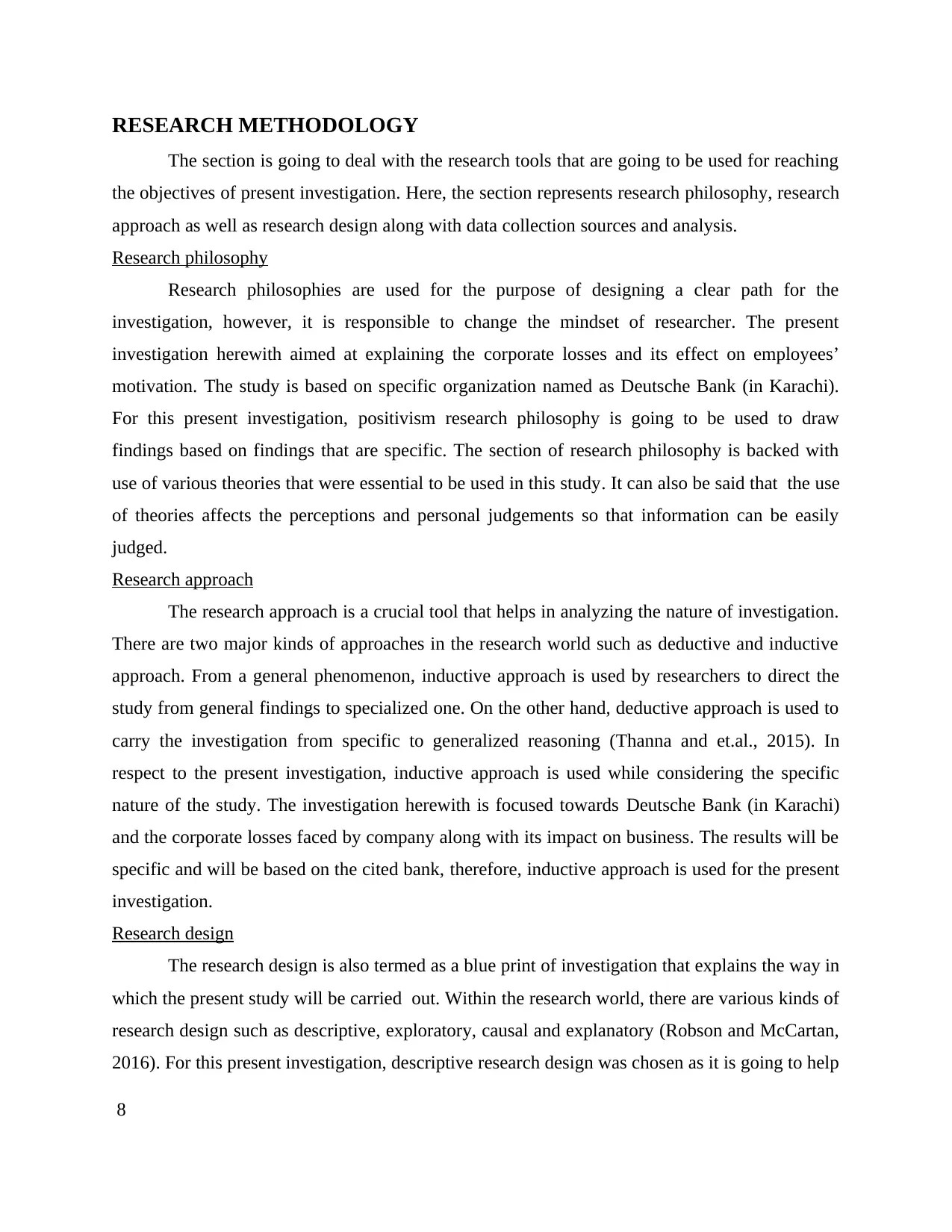
RESEARCH METHODOLOGY
The section is going to deal with the research tools that are going to be used for reaching
the objectives of present investigation. Here, the section represents research philosophy, research
approach as well as research design along with data collection sources and analysis.
Research philosophy
Research philosophies are used for the purpose of designing a clear path for the
investigation, however, it is responsible to change the mindset of researcher. The present
investigation herewith aimed at explaining the corporate losses and its effect on employees’
motivation. The study is based on specific organization named as Deutsche Bank (in Karachi).
For this present investigation, positivism research philosophy is going to be used to draw
findings based on findings that are specific. The section of research philosophy is backed with
use of various theories that were essential to be used in this study. It can also be said that the use
of theories affects the perceptions and personal judgements so that information can be easily
judged.
Research approach
The research approach is a crucial tool that helps in analyzing the nature of investigation.
There are two major kinds of approaches in the research world such as deductive and inductive
approach. From a general phenomenon, inductive approach is used by researchers to direct the
study from general findings to specialized one. On the other hand, deductive approach is used to
carry the investigation from specific to generalized reasoning (Thanna and et.al., 2015). In
respect to the present investigation, inductive approach is used while considering the specific
nature of the study. The investigation herewith is focused towards Deutsche Bank (in Karachi)
and the corporate losses faced by company along with its impact on business. The results will be
specific and will be based on the cited bank, therefore, inductive approach is used for the present
investigation.
Research design
The research design is also termed as a blue print of investigation that explains the way in
which the present study will be carried out. Within the research world, there are various kinds of
research design such as descriptive, exploratory, causal and explanatory (Robson and McCartan,
2016). For this present investigation, descriptive research design was chosen as it is going to help
8
The section is going to deal with the research tools that are going to be used for reaching
the objectives of present investigation. Here, the section represents research philosophy, research
approach as well as research design along with data collection sources and analysis.
Research philosophy
Research philosophies are used for the purpose of designing a clear path for the
investigation, however, it is responsible to change the mindset of researcher. The present
investigation herewith aimed at explaining the corporate losses and its effect on employees’
motivation. The study is based on specific organization named as Deutsche Bank (in Karachi).
For this present investigation, positivism research philosophy is going to be used to draw
findings based on findings that are specific. The section of research philosophy is backed with
use of various theories that were essential to be used in this study. It can also be said that the use
of theories affects the perceptions and personal judgements so that information can be easily
judged.
Research approach
The research approach is a crucial tool that helps in analyzing the nature of investigation.
There are two major kinds of approaches in the research world such as deductive and inductive
approach. From a general phenomenon, inductive approach is used by researchers to direct the
study from general findings to specialized one. On the other hand, deductive approach is used to
carry the investigation from specific to generalized reasoning (Thanna and et.al., 2015). In
respect to the present investigation, inductive approach is used while considering the specific
nature of the study. The investigation herewith is focused towards Deutsche Bank (in Karachi)
and the corporate losses faced by company along with its impact on business. The results will be
specific and will be based on the cited bank, therefore, inductive approach is used for the present
investigation.
Research design
The research design is also termed as a blue print of investigation that explains the way in
which the present study will be carried out. Within the research world, there are various kinds of
research design such as descriptive, exploratory, causal and explanatory (Robson and McCartan,
2016). For this present investigation, descriptive research design was chosen as it is going to help
8
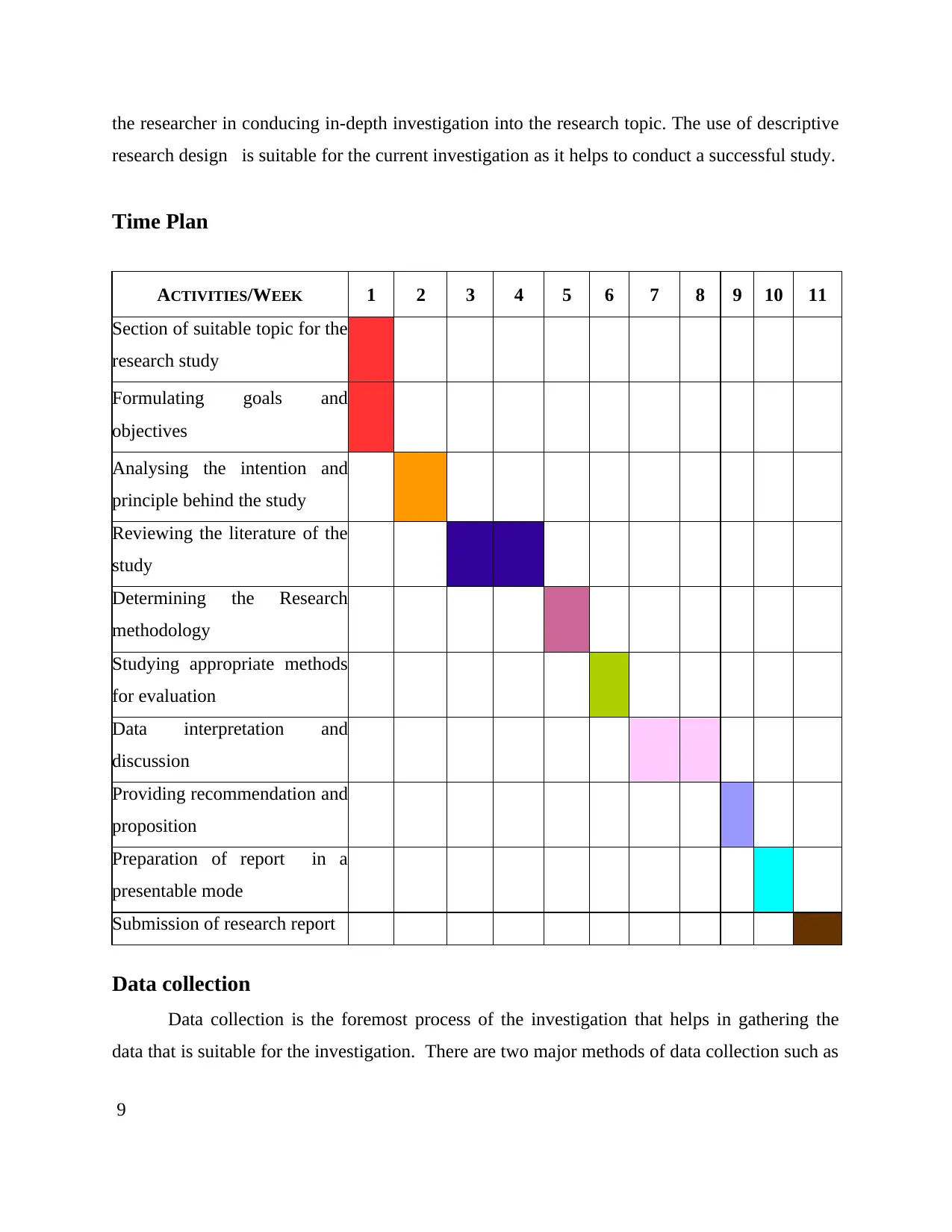
the researcher in conducing in-depth investigation into the research topic. The use of descriptive
research design is suitable for the current investigation as it helps to conduct a successful study.
Time Plan
ACTIVITIES/WEEK 1 2 3 4 5 6 7 8 9 10 11
Section of suitable topic for the
research study
Formulating goals and
objectives
Analysing the intention and
principle behind the study
Reviewing the literature of the
study
Determining the Research
methodology
Studying appropriate methods
for evaluation
Data interpretation and
discussion
Providing recommendation and
proposition
Preparation of report in a
presentable mode
Submission of research report
Data collection
Data collection is the foremost process of the investigation that helps in gathering the
data that is suitable for the investigation. There are two major methods of data collection such as
9
research design is suitable for the current investigation as it helps to conduct a successful study.
Time Plan
ACTIVITIES/WEEK 1 2 3 4 5 6 7 8 9 10 11
Section of suitable topic for the
research study
Formulating goals and
objectives
Analysing the intention and
principle behind the study
Reviewing the literature of the
study
Determining the Research
methodology
Studying appropriate methods
for evaluation
Data interpretation and
discussion
Providing recommendation and
proposition
Preparation of report in a
presentable mode
Submission of research report
Data collection
Data collection is the foremost process of the investigation that helps in gathering the
data that is suitable for the investigation. There are two major methods of data collection such as
9
⊘ This is a preview!⊘
Do you want full access?
Subscribe today to unlock all pages.

Trusted by 1+ million students worldwide
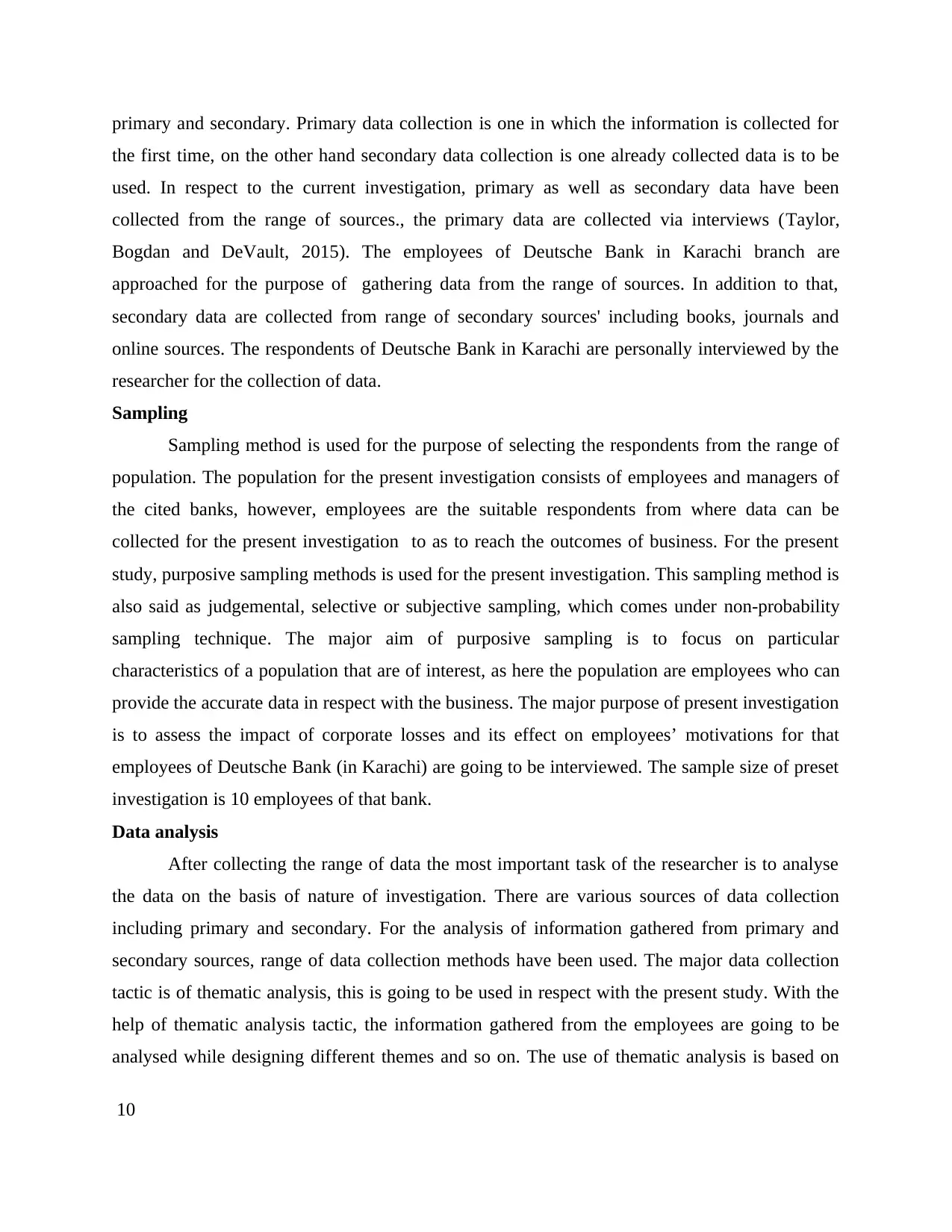
primary and secondary. Primary data collection is one in which the information is collected for
the first time, on the other hand secondary data collection is one already collected data is to be
used. In respect to the current investigation, primary as well as secondary data have been
collected from the range of sources., the primary data are collected via interviews (Taylor,
Bogdan and DeVault, 2015). The employees of Deutsche Bank in Karachi branch are
approached for the purpose of gathering data from the range of sources. In addition to that,
secondary data are collected from range of secondary sources' including books, journals and
online sources. The respondents of Deutsche Bank in Karachi are personally interviewed by the
researcher for the collection of data.
Sampling
Sampling method is used for the purpose of selecting the respondents from the range of
population. The population for the present investigation consists of employees and managers of
the cited banks, however, employees are the suitable respondents from where data can be
collected for the present investigation to as to reach the outcomes of business. For the present
study, purposive sampling methods is used for the present investigation. This sampling method is
also said as judgemental, selective or subjective sampling, which comes under non-probability
sampling technique. The major aim of purposive sampling is to focus on particular
characteristics of a population that are of interest, as here the population are employees who can
provide the accurate data in respect with the business. The major purpose of present investigation
is to assess the impact of corporate losses and its effect on employees’ motivations for that
employees of Deutsche Bank (in Karachi) are going to be interviewed. The sample size of preset
investigation is 10 employees of that bank.
Data analysis
After collecting the range of data the most important task of the researcher is to analyse
the data on the basis of nature of investigation. There are various sources of data collection
including primary and secondary. For the analysis of information gathered from primary and
secondary sources, range of data collection methods have been used. The major data collection
tactic is of thematic analysis, this is going to be used in respect with the present study. With the
help of thematic analysis tactic, the information gathered from the employees are going to be
analysed while designing different themes and so on. The use of thematic analysis is based on
10
the first time, on the other hand secondary data collection is one already collected data is to be
used. In respect to the current investigation, primary as well as secondary data have been
collected from the range of sources., the primary data are collected via interviews (Taylor,
Bogdan and DeVault, 2015). The employees of Deutsche Bank in Karachi branch are
approached for the purpose of gathering data from the range of sources. In addition to that,
secondary data are collected from range of secondary sources' including books, journals and
online sources. The respondents of Deutsche Bank in Karachi are personally interviewed by the
researcher for the collection of data.
Sampling
Sampling method is used for the purpose of selecting the respondents from the range of
population. The population for the present investigation consists of employees and managers of
the cited banks, however, employees are the suitable respondents from where data can be
collected for the present investigation to as to reach the outcomes of business. For the present
study, purposive sampling methods is used for the present investigation. This sampling method is
also said as judgemental, selective or subjective sampling, which comes under non-probability
sampling technique. The major aim of purposive sampling is to focus on particular
characteristics of a population that are of interest, as here the population are employees who can
provide the accurate data in respect with the business. The major purpose of present investigation
is to assess the impact of corporate losses and its effect on employees’ motivations for that
employees of Deutsche Bank (in Karachi) are going to be interviewed. The sample size of preset
investigation is 10 employees of that bank.
Data analysis
After collecting the range of data the most important task of the researcher is to analyse
the data on the basis of nature of investigation. There are various sources of data collection
including primary and secondary. For the analysis of information gathered from primary and
secondary sources, range of data collection methods have been used. The major data collection
tactic is of thematic analysis, this is going to be used in respect with the present study. With the
help of thematic analysis tactic, the information gathered from the employees are going to be
analysed while designing different themes and so on. The use of thematic analysis is based on
10
Paraphrase This Document
Need a fresh take? Get an instant paraphrase of this document with our AI Paraphraser
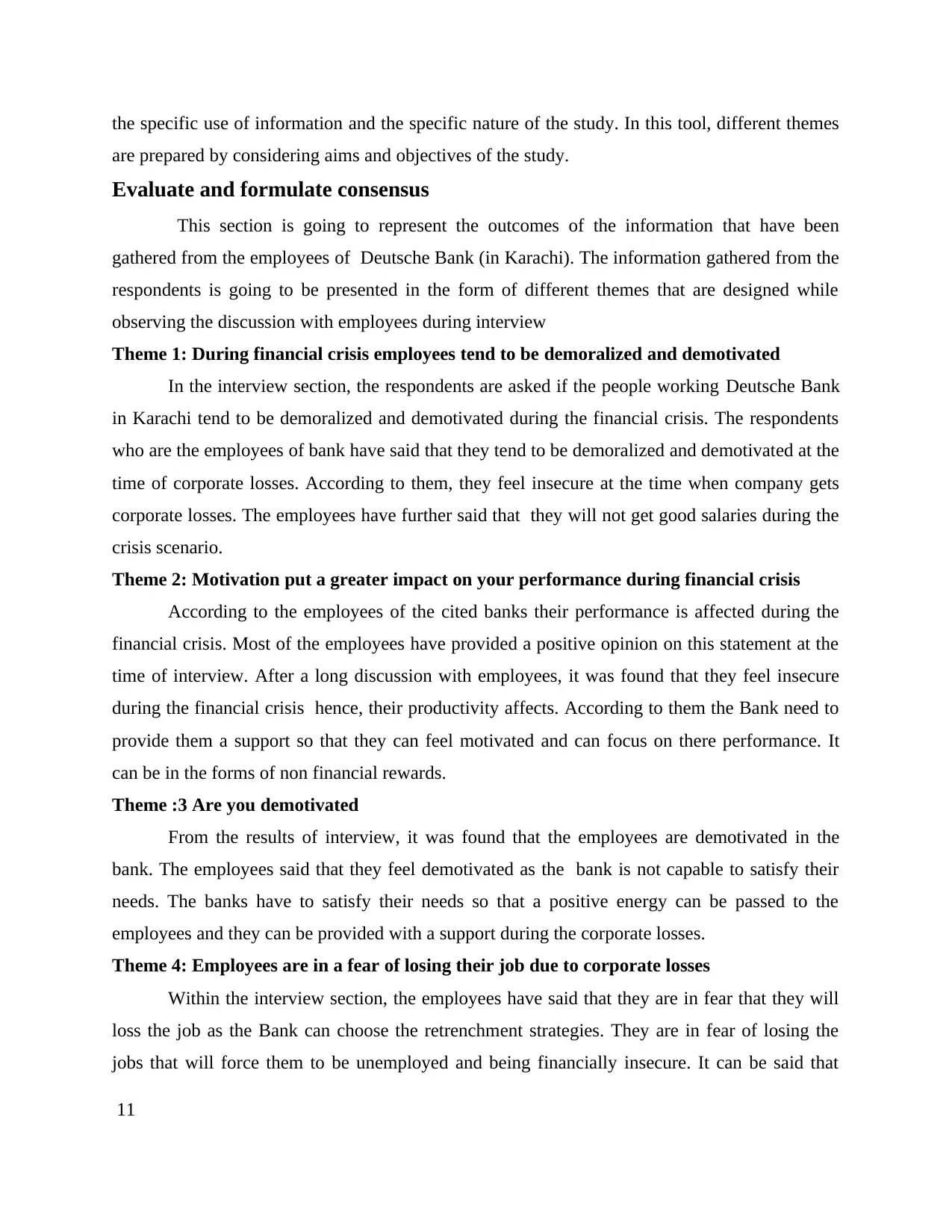
the specific use of information and the specific nature of the study. In this tool, different themes
are prepared by considering aims and objectives of the study.
Evaluate and formulate consensus
This section is going to represent the outcomes of the information that have been
gathered from the employees of Deutsche Bank (in Karachi). The information gathered from the
respondents is going to be presented in the form of different themes that are designed while
observing the discussion with employees during interview
Theme 1: During financial crisis employees tend to be demoralized and demotivated
In the interview section, the respondents are asked if the people working Deutsche Bank
in Karachi tend to be demoralized and demotivated during the financial crisis. The respondents
who are the employees of bank have said that they tend to be demoralized and demotivated at the
time of corporate losses. According to them, they feel insecure at the time when company gets
corporate losses. The employees have further said that they will not get good salaries during the
crisis scenario.
Theme 2: Motivation put a greater impact on your performance during financial crisis
According to the employees of the cited banks their performance is affected during the
financial crisis. Most of the employees have provided a positive opinion on this statement at the
time of interview. After a long discussion with employees, it was found that they feel insecure
during the financial crisis hence, their productivity affects. According to them the Bank need to
provide them a support so that they can feel motivated and can focus on there performance. It
can be in the forms of non financial rewards.
Theme :3 Are you demotivated
From the results of interview, it was found that the employees are demotivated in the
bank. The employees said that they feel demotivated as the bank is not capable to satisfy their
needs. The banks have to satisfy their needs so that a positive energy can be passed to the
employees and they can be provided with a support during the corporate losses.
Theme 4: Employees are in a fear of losing their job due to corporate losses
Within the interview section, the employees have said that they are in fear that they will
loss the job as the Bank can choose the retrenchment strategies. They are in fear of losing the
jobs that will force them to be unemployed and being financially insecure. It can be said that
11
are prepared by considering aims and objectives of the study.
Evaluate and formulate consensus
This section is going to represent the outcomes of the information that have been
gathered from the employees of Deutsche Bank (in Karachi). The information gathered from the
respondents is going to be presented in the form of different themes that are designed while
observing the discussion with employees during interview
Theme 1: During financial crisis employees tend to be demoralized and demotivated
In the interview section, the respondents are asked if the people working Deutsche Bank
in Karachi tend to be demoralized and demotivated during the financial crisis. The respondents
who are the employees of bank have said that they tend to be demoralized and demotivated at the
time of corporate losses. According to them, they feel insecure at the time when company gets
corporate losses. The employees have further said that they will not get good salaries during the
crisis scenario.
Theme 2: Motivation put a greater impact on your performance during financial crisis
According to the employees of the cited banks their performance is affected during the
financial crisis. Most of the employees have provided a positive opinion on this statement at the
time of interview. After a long discussion with employees, it was found that they feel insecure
during the financial crisis hence, their productivity affects. According to them the Bank need to
provide them a support so that they can feel motivated and can focus on there performance. It
can be in the forms of non financial rewards.
Theme :3 Are you demotivated
From the results of interview, it was found that the employees are demotivated in the
bank. The employees said that they feel demotivated as the bank is not capable to satisfy their
needs. The banks have to satisfy their needs so that a positive energy can be passed to the
employees and they can be provided with a support during the corporate losses.
Theme 4: Employees are in a fear of losing their job due to corporate losses
Within the interview section, the employees have said that they are in fear that they will
loss the job as the Bank can choose the retrenchment strategies. They are in fear of losing the
jobs that will force them to be unemployed and being financially insecure. It can be said that
11
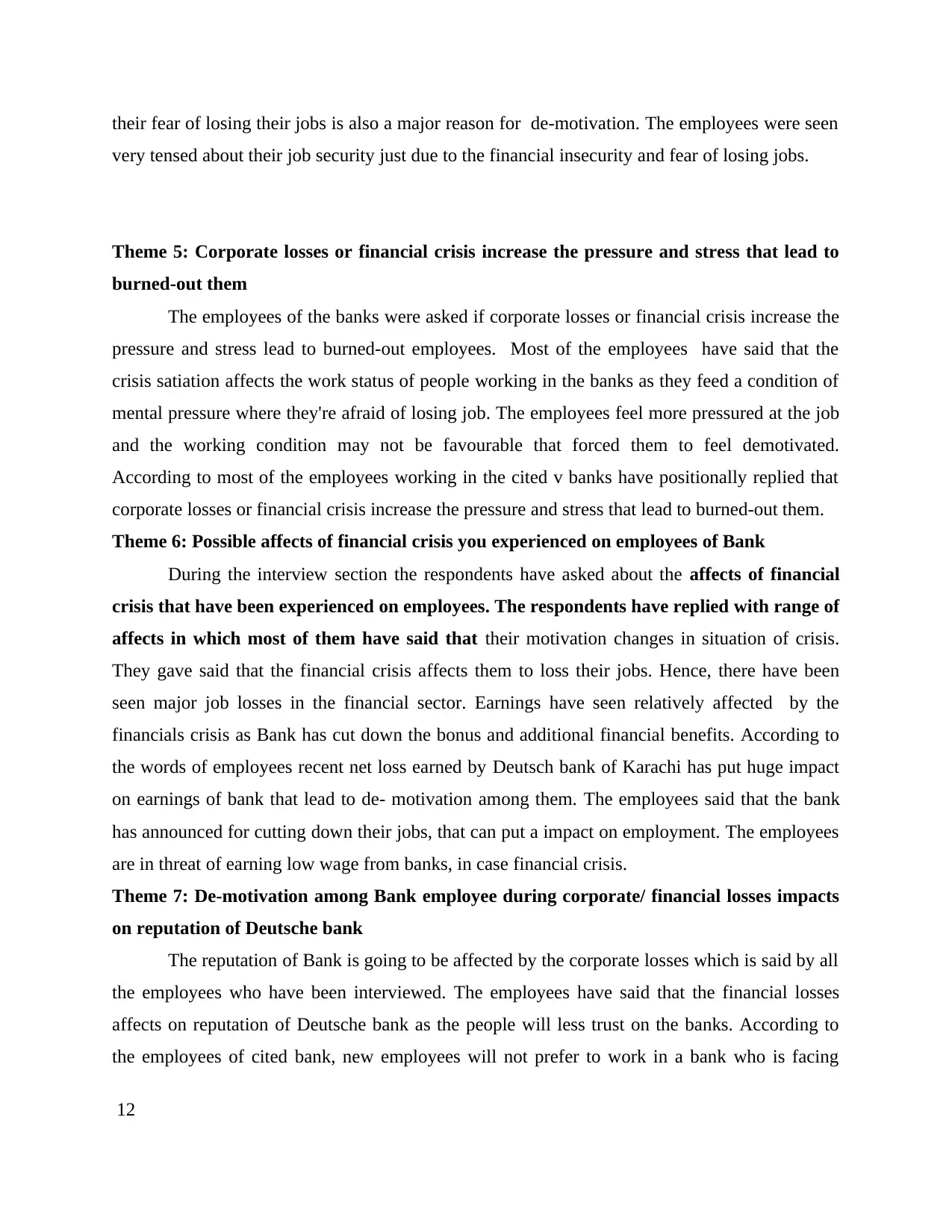
their fear of losing their jobs is also a major reason for de-motivation. The employees were seen
very tensed about their job security just due to the financial insecurity and fear of losing jobs.
Theme 5: Corporate losses or financial crisis increase the pressure and stress that lead to
burned-out them
The employees of the banks were asked if corporate losses or financial crisis increase the
pressure and stress lead to burned-out employees. Most of the employees have said that the
crisis satiation affects the work status of people working in the banks as they feed a condition of
mental pressure where they're afraid of losing job. The employees feel more pressured at the job
and the working condition may not be favourable that forced them to feel demotivated.
According to most of the employees working in the cited v banks have positionally replied that
corporate losses or financial crisis increase the pressure and stress that lead to burned-out them.
Theme 6: Possible affects of financial crisis you experienced on employees of Bank
During the interview section the respondents have asked about the affects of financial
crisis that have been experienced on employees. The respondents have replied with range of
affects in which most of them have said that their motivation changes in situation of crisis.
They gave said that the financial crisis affects them to loss their jobs. Hence, there have been
seen major job losses in the financial sector. Earnings have seen relatively affected by the
financials crisis as Bank has cut down the bonus and additional financial benefits. According to
the words of employees recent net loss earned by Deutsch bank of Karachi has put huge impact
on earnings of bank that lead to de- motivation among them. The employees said that the bank
has announced for cutting down their jobs, that can put a impact on employment. The employees
are in threat of earning low wage from banks, in case financial crisis.
Theme 7: De-motivation among Bank employee during corporate/ financial losses impacts
on reputation of Deutsche bank
The reputation of Bank is going to be affected by the corporate losses which is said by all
the employees who have been interviewed. The employees have said that the financial losses
affects on reputation of Deutsche bank as the people will less trust on the banks. According to
the employees of cited bank, new employees will not prefer to work in a bank who is facing
12
very tensed about their job security just due to the financial insecurity and fear of losing jobs.
Theme 5: Corporate losses or financial crisis increase the pressure and stress that lead to
burned-out them
The employees of the banks were asked if corporate losses or financial crisis increase the
pressure and stress lead to burned-out employees. Most of the employees have said that the
crisis satiation affects the work status of people working in the banks as they feed a condition of
mental pressure where they're afraid of losing job. The employees feel more pressured at the job
and the working condition may not be favourable that forced them to feel demotivated.
According to most of the employees working in the cited v banks have positionally replied that
corporate losses or financial crisis increase the pressure and stress that lead to burned-out them.
Theme 6: Possible affects of financial crisis you experienced on employees of Bank
During the interview section the respondents have asked about the affects of financial
crisis that have been experienced on employees. The respondents have replied with range of
affects in which most of them have said that their motivation changes in situation of crisis.
They gave said that the financial crisis affects them to loss their jobs. Hence, there have been
seen major job losses in the financial sector. Earnings have seen relatively affected by the
financials crisis as Bank has cut down the bonus and additional financial benefits. According to
the words of employees recent net loss earned by Deutsch bank of Karachi has put huge impact
on earnings of bank that lead to de- motivation among them. The employees said that the bank
has announced for cutting down their jobs, that can put a impact on employment. The employees
are in threat of earning low wage from banks, in case financial crisis.
Theme 7: De-motivation among Bank employee during corporate/ financial losses impacts
on reputation of Deutsche bank
The reputation of Bank is going to be affected by the corporate losses which is said by all
the employees who have been interviewed. The employees have said that the financial losses
affects on reputation of Deutsche bank as the people will less trust on the banks. According to
the employees of cited bank, new employees will not prefer to work in a bank who is facing
12
⊘ This is a preview!⊘
Do you want full access?
Subscribe today to unlock all pages.

Trusted by 1+ million students worldwide
1 out of 18
Related Documents
Your All-in-One AI-Powered Toolkit for Academic Success.
+13062052269
info@desklib.com
Available 24*7 on WhatsApp / Email
![[object Object]](/_next/static/media/star-bottom.7253800d.svg)
Unlock your academic potential
Copyright © 2020–2026 A2Z Services. All Rights Reserved. Developed and managed by ZUCOL.





